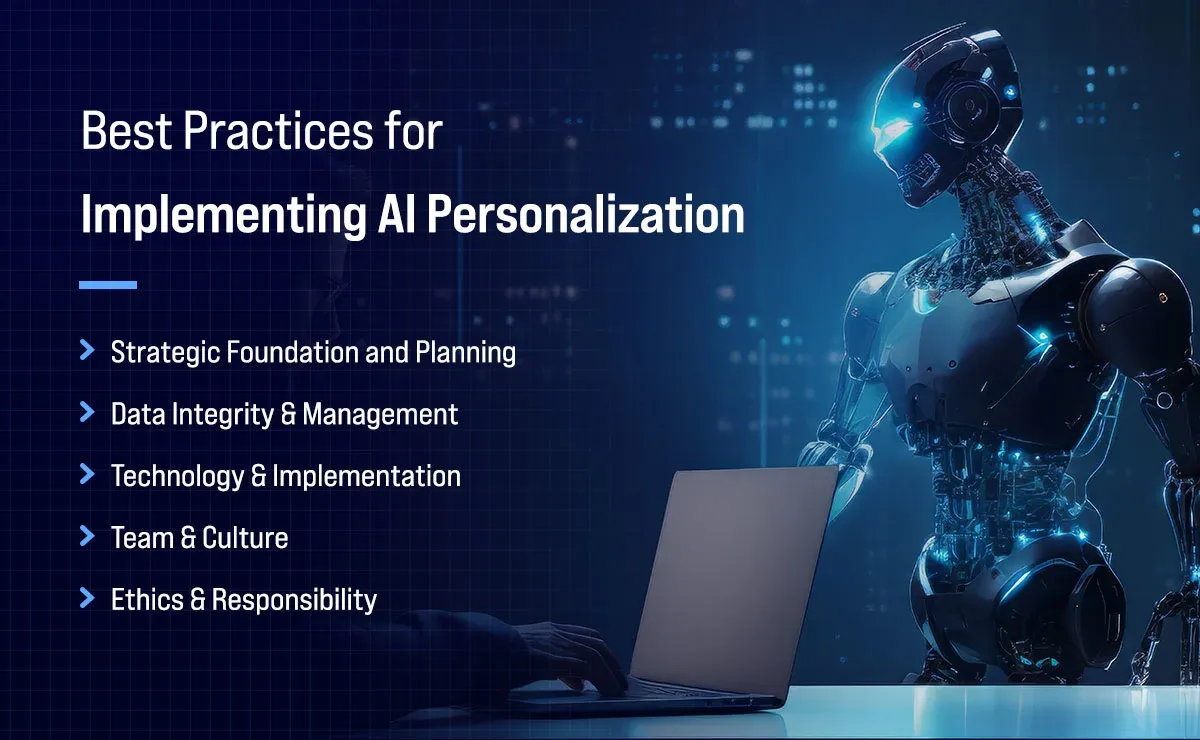How Does AI Help in Personalized Marketing?

The marketing landscape in India is experiencing a seismic shift. Eighty-eight percent of digital marketers now integrate AI into their daily workflows, establishing artificial intelligence as the fundamental component of successful tailored marketing approaches. Expenditure on AI is projected to increase at more than double the pace of total digital technology spending within the next three years, producing an economic effect exceeding $115 billion by 2027.
For businesses operating in India, this presents an unprecedented opportunity to connect with customers on a deeply personal level while achieving measurable business outcomes. This article explains what AI personalization is, explores key applications, and lays out the benefits, the main challenges, and the best practices for implementing AI-driven personalization in your marketing programs.
What Is AI Personalization in Marketing?
AI personalization in marketing represents the convergence of artificial intelligence, machine learning, and data analytics to create individualized customer experiences at scale. Unlike traditional marketing approaches that rely on broad demographic segments, AI personalization analyzes vast datasets and real-time engagement patterns to deliver precisely targeted content, offers, and recommendations to each customer.

McKinsey’s study indicates that 71% of buyers anticipate companies to provide customized content and 89% of marketing professionals observe positive returns on investment from AI-driven customization. At its core, AI personalization involves four main components:
- Dynamic Content Generation: AI systems automatically create and modify content based on individual user profiles, ensuring every interaction feels personally crafted. This encompasses tailored email headings, item summaries, and web content that adjusts instantaneously.
- Predictive Analysis: ML algorithms examine past information to forecast upcoming consumer actions, allowing for preemptive customization. As an example, forecasting when a buyer is probable to complete a subsequent purchase or recognizing items they are most likely to find appealing.
- Real-Time Decision Making: AI processes customer interactions instantaneously, making split-second decisions about what content, offers, or recommendations to display. This produces fluid, situationally appropriate interactions throughout every point of contact.
- Recognition of Behavioral Patterns: Sophisticated algorithms detect nuanced patterns in user conduct that could elude human observation, allowing for micro-segmentation and precisely aimed initiatives.
When executed well, AI personalization feels like a one-to-one conversation between brand and customer, even for audiences numbering in the millions.
Key Market Insight: According to research by EY, 82% of Indian consumers are open to improving their purchase decisions using AI, which is significantly higher than the global average of 58%. This demonstrates India's unique readiness to embrace AI-driven marketing innovations.
Key Applications of AI Personalization Tools
AI personalization is not a single product. It is a set of capabilities that can be applied across the marketing stack. Here are six high-impact applications.
1) Intelligent Email Marketing Automation
AI-powered email marketing has revolutionized how Indian businesses communicate with customers. Customized emails achieve transaction rates six times greater than generic ones and produce an average return on investment of 122%.
Key Features:
- Intelligent Send Time Optimization: Artificial intelligence assesses each recipient's activity to identify the ideal time for delivery.
- Dynamic Subject Line Creation: Algorithms produce customized headings that are 26% more likely to be opened.
- Campaigns Activated by Behavior: Automated series triggered by specific consumer actions.
AI-driven campaigns achieve 13% higher click-through rates and 41% revenue growth. By 2026, 70% of marketers expect half of their email operations to be AI-driven, making it one of the most impactful applications for organizations.
2) Advanced Customer Segmentation
Traditional demographic segmentation is being replaced by AI-driven behavioral intelligence that creates dynamic, real-time customer segments. Organizations employing AI-powered segmentation see a sales boost of 10-15% and a 10-20% enhancement in client contentment. Moreover, 77% of companies identify advanced segmentation as a growth driver.
AI Segmentation Capabilities:
- Predictive Intent Modeling: Identifying high-value customers before they make purchase decisions.
- Real-Time Behavioral Clustering: Grouping customers based on current behavior patterns.
- Lifetime Value Prediction: Segmenting customers by predicted long-term value.
Algorithms that continuously update based on new interactions, segmentation remain dynamic and actionable. This allows marketers to micro-target effectively, anticipate trends, and stay aligned with shifting consumer behavior.
3) Personalized Product Recommendations
AI suggestion systems have evolved into the essential foundation of prosperous online retail activities. For example, Netflix generates $1 billion annually from automated personalized recommendations, and by 2032, the eCommerce AI market is expected to reach $45.72 billion, demonstrating the revenue potential of sophisticated recommendation systems.
Implementation Benefits:
- Cross-Selling Optimization: AI identifies complementary products with 85% accuracy.
- Seasonal Trend Integration: Algorithms adapt recommendations based on regional and seasonal preferences.
- Analysis of Price Sensitivity: AI offers customized pricing approaches derived from individual consumer profiles.
For Indian companies, AI systems adapt to regional diversity, from language preferences to festival-driven buying habits. With predictive analytics and inventory integration, businesses optimize both personalization and profitability, ensuring customers receive tailored, culturally relevant suggestions.
4) Intelligent Chatbots and Conversational AI
Conversational AI has redefined how businesses engage with customers, creating scalable and cost-effective personalization. In 2025, the chatbot market is valued at $10–15 billion, expanding at a 24–30% CAGR. Companies using AI chatbots report 35% lower support costs and 24% higher satisfaction levels.
Advanced Capabilities:
- Natural Language Processing: Understanding context and sentiment in customer inquiries.
- Personalized Product Discovery: Guiding customers to relevant products through conversational interfaces.
- 24/7 Multilingual Support: It is especially essential for India's diverse linguistic landscape.
Beyond query resolution, chatbots recommend products, qualify leads, and personalize journeys. With advanced natural language processing, bots understand context, sentiment, and intent, responding three times faster and enriching customer engagement.
5) Dynamic Website Personalization
Websites are no longer static platforms. AI-powered personalization adjusts layouts, offers, and content in real time to match visitor intent. Research shows that 76% of the customers get frustrated without personalized interactions. Companies adopting smart personalization report up to 40% revenue growth.
Personalization Elements:
- Content Adaptation: Displaying relevant blog posts, case studies, and resources.
- Navigation Optimization: Customizing menu structures based on user preferences.
- Localized Experiences: Adapting content for different Indian regions and languages.
For Indian enterprises, the ability to localize experiences, whether for regional festivals or cultural nuances, creates a competitive advantage and ensures every visitor sees tailored, engaging content.
6) Predictive Customer Journey Mapping
AI-facilitated journey mapping allows firms to foresee client requirements and develop preemptive interaction plans. As clients anticipate companies to comprehend their likes, predictive mapping produces a quantifiable effect. Companies using AI analytics in journey design see 25% higher conversion rates in sales.
Journey Optimization Features:
- Churn Prevention: Identifying at-risk customers and triggering retention campaigns.
- Upselling Opportunities: Predicting optimal timing for upgrade offers.
- Channel Preference Learning: Determining preferred communication channels for each customer.
Notably, 85% of businesses using AI journey mapping improves customer satisfaction. For Indian businesses, this capability is crucial for managing diverse, multi-channel, multilingual customer relationships, ensuring each step feels relevant and frictionless.
Benefits of AI Personalization for Marketing
When implemented responsibly, AI personalization unlocks a range of measurable benefits.
- Revenue Growth and ROI Enhancement: The financial impact of AI personalization is substantial and measurable. Organizations using AI across marketing operations will pivot 75% of their staff from production to strategic tasks, enabling more sophisticated campaigns and better resource allocation.
- Improved Client Contentment: AI customization converts the client interaction from a mere transaction to a relationship. Fifty-two percent of buyers note greater satisfaction in individualized interactions, and 69% of enterprises persist in growing personalization expenditures irrespective of economic instability.
- Operational Superiority: AI allows for customization on a grand scale without a corresponding rise in resource allocation. Thirty percent of outbound marketing communications in big firms will be created by AI in the coming years.
- Competitive Advantage: For Indian businesses, AI personalization offers unique advantages in a diverse and rapidly evolving market. Indian buyers show greater trust in AI-produced customized suggestions relative to worldwide norms. Additionally, AI learns regional preferences and cultural nuances, making it adaptable for campaigns during Indian festivals and shopping seasons.
- Increased Return on Marketing Spend: Personalized promotions and customized offers have repeatedly shown larger returns compared to one-size-fits-all campaigns. This kind of uplift is what makes personalization a priority for teams that need to squeeze more performance from existing budgets.
Challenges of Using AI Personalization in Marketing
AI personalization is powerful but complex. Enterprises face some of these real challenges mentioned below that must be managed.
- Data Privacy and Regulatory Compliance: The most significant challenge faced by companies in AI personalization is balancing effectiveness with privacy protection. Brands must capture clear consent, be transparent about data usage, and implement strong security controls. Privacy-improving methods like anonymization, pseudonymization, and differential privacy could mitigate risk while retaining analytical usefulness.
- Implementation Complexity: Deploying effective AI personalization requires significant technical infrastructure and expertise. Forty-three percent of marketing professionals implementing AI concede they are uncertain about how to optimize its benefit. Organizations also worry about the costs of using AI tools, particularly small businesses that may lack resources for comprehensive AI implementation.
- Loss of Human Touch: Excessive automation can erode empathy and brand humanity. A hybrid model that uses AI for prediction and humans for relationship building avoids mechanical interactions and preserves the human judgment that matters for sensitive or complex cases.
- Customer Trust and Transparency: Building customer confidence in AI-driven experiences requires a careful balance between personalization and transparency. Despite merely 24% of clients voicing worries about AI-facilitated interactions, confidence remains delicate.
- Bias and Equity in Models: ML models trained on past actions can perpetuate existing prejudices. This is why teams must audit models, test for disparate impacts, and apply fairness adjustments when needed.
Best Practices for Implementing AI Personalization
To minimize risk and maximize impact, follow an incremental and governance driven approach.

1) Strategic Foundation and Planning
Successful AI personalization implementation begins with a clear strategy and realistic expectations.
- Anchor your strategy in clear, measurable business goals to ensure ROI and focus.
- Begin with controlled pilot programs to demonstrate value and refine your approach before scaling.
- Prioritize customer value and enhance experiences over purely internal business metrics.
- Foster collaboration between marketing, IT, and data teams to ensure seamless execution.
2) Data Integrity & Management
Your AI's performance is directly reliant on the caliber and soundness of your data.
- Build a foundation of trusted first-party data for more accurate and reliable personalization.
- Establish a robust governance framework to ensure ethical and compliant data usage.
- Apply stringent quality controls to uphold information precision, which is vital for AI achievement.
- Incorporate privacy safeguards from the outset to establish client confidence and guarantee adherence to regulations.
3) Technology & Implementation
Choosing the right technology stack is critical for seamless integration and scalable growth.
- Pick AI systems that merge effortlessly with your current technology infrastructure.
- Opt for expandable systems capable of developing and adjusting concurrent with your changing business demands.
- Architect systems with APIs for flexible data sharing and future-proof integration.
- Enforce stringent security protocols to safeguard customer data throughout the AI lifecycle.
4) Team & Culture
Empowering your people and adapting to your market are essential for organizational adoption.
- Invest in AI literacy training to empower your team to use new tools effectively.
- Foster an insight-oriented culture that appreciates and responds to AI-generated consumer intelligence.
- Ensure personalization respects cultural nuances to build deeper, more respectful customer connections.
- Implement multilingual support to authentically engage a diverse customer base.
5) Ethics & Responsibility
Implementing AI responsibly is non-negotiable for building sustainable customer trust.
- Preemptively examine for prejudice to guarantee just and impartial handling of all consumer groups.
- Sustain openness regarding how AI is utilized to promote consumer comprehension and confidence.
- Retain human oversight for critical decisions, ensuring accountability remains paramount.
- Provide clients with authority over their information and interaction to enable and establish trust.
Summing Up
AI personalization is rapidly setting new benchmarks for effective marketing in India, as adoption reaches unprecedented levels across industries. Brands harnessing this technology, notably across eCommerce, banking, and FMCG, are already realizing tangible business results.
Yet, the true differentiator will be how Indian organizations invest in people, data quality, and responsible AI governance. As the digital market becomes more competitive, those who align strategy with local context, ethical use, and team capability will consistently outpace their rivals.
To secure impact and leadership in this evolving landscape, businesses should now move from tactical pilots to enterprise-wide adoption. Treat AI as a business model catalyst and not just a tool to unlock unmatched customer loyalty, efficiency, and growth.

